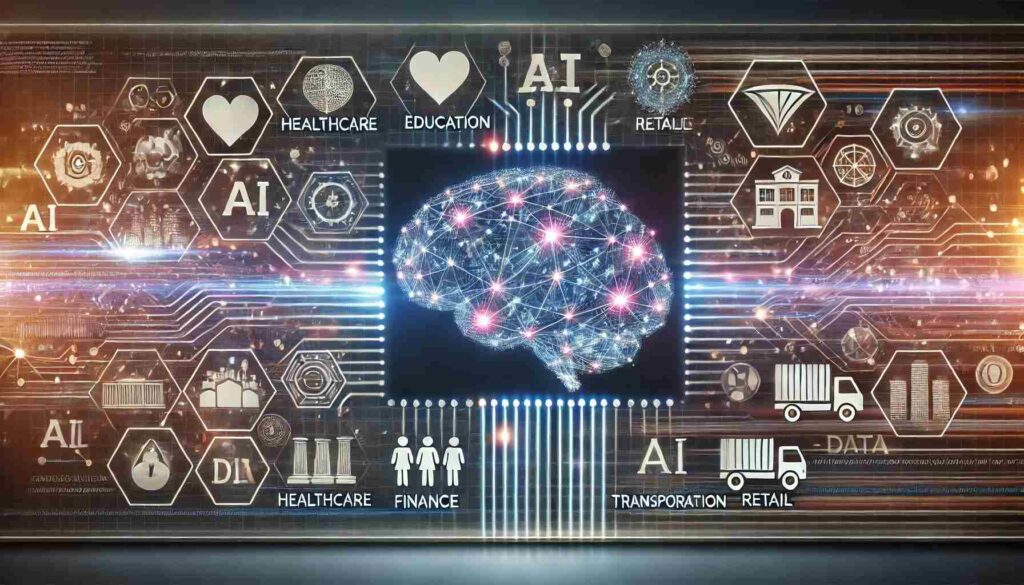How AI is Transforming the Future Across Industries

Introduction
Artificial Intelligence (AI) is no longer a concept of the distant future; it’s here and now, revolutionizing industries and reshaping the way we live, work, and interact. From healthcare to education, AI is making significant strides, driving innovation, and opening up new possibilities. This blog explores the transformative impact of AI across various sectors and the potential it holds for the future.
1. AI in Healthcare: A New Era of Precision Medicine
AI is redefining the healthcare industry by enabling precision medicine, improving diagnostics, and enhancing patient care. With the ability to analyze vast amounts of medical data, AI systems can identify patterns and predict outcomes with unprecedented accuracy. From detecting early signs of diseases to personalizing treatment plans, AI is helping healthcare professionals make more informed decisions, ultimately leading to better patient outcomes.
Moreover, AI-driven tools like chatbots and virtual assistants are streamlining administrative tasks, reducing the burden on healthcare providers, and allowing them to focus more on patient care. As AI continues to evolve, it holds the promise of making healthcare more accessible, efficient, and effective.
2. AI in Education: Personalized Learning for All
The education sector is undergoing a significant transformation with the integration of AI. Traditional one-size-fits-all teaching methods are being replaced by personalized learning experiences tailored to individual students’ needs. AI-powered platforms can assess a student’s strengths, weaknesses, and learning style, offering customized lessons and resources that enhance the learning experience.
In addition, AI is helping educators by automating administrative tasks such as grading and attendance tracking, allowing them to focus more on teaching and student engagement. The potential for AI in education is vast, and as the technology continues to develop, it will play an increasingly important role in shaping the future of learning.
3. AI in Finance: Redefining Risk Management and Investment Strategies
The financial industry has been quick to adopt AI, leveraging its capabilities to enhance risk management, fraud detection, and investment strategies. AI algorithms can analyze vast amounts of financial data in real time, identifying trends and anomalies that would be impossible for humans to detect. This allows financial institutions to make more informed decisions, minimize risks, and optimize investment portfolios.
Furthermore, AI-powered chatbots and virtual assistants are improving customer service in the financial sector, providing clients with personalized advice and support 24/7. As AI continues to evolve, it will undoubtedly play a pivotal role in driving innovation and growth in the finance industry.
4. AI in Retail: Enhancing Customer Experiences
AI is revolutionizing the retail industry by offering personalized shopping experiences and optimizing supply chain management. Retailers are using AI to analyze customer data, predict buying behavior, and recommend products tailored to individual preferences. This level of personalization enhances customer satisfaction and drives sales.
Additionally, AI is streamlining logistics and inventory management, ensuring that products are available when and where customers need them. By analyzing sales data and market trends, AI can forecast demand more accurately, reducing waste and improving efficiency across the supply chain.
5. AI in Transportation: The Future of Mobility
The transportation industry is on the brink of a revolution, with AI playing a central role in the development of autonomous vehicles, smart cities, and efficient logistics systems. AI-powered self-driving cars are expected to reduce traffic accidents, lower emissions, and transform the way we commute.
Moreover, AI is enhancing the efficiency of public transportation systems by optimizing routes, schedules, and maintenance. In logistics, AI is improving supply chain management, reducing delivery times, and minimizing costs. As AI continues to advance, it will reshape the future of mobility and transportation, making it safer, more efficient, and more sustainable.
Conclusion
Artificial Intelligence is more than just a technological advancement; it’s a catalyst for change across industries. Its ability to process and analyze vast amounts of data, make predictions, and automate tasks is driving innovation and opening up new possibilities. As we continue to explore and harness the potential of AI, it’s clear that it will play an increasingly important role in shaping the future.
Whether in healthcare, education, finance, retail, or transportation, AI is transforming the way we live and work, and the possibilities are endless. The future of AI is bright, and its impact will be felt across every aspect of our lives.
Source : Medium




